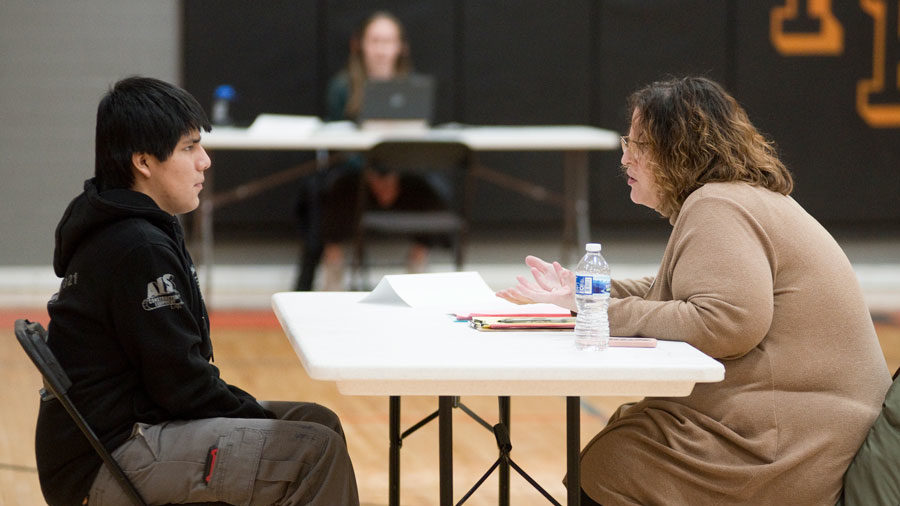Photography by Dianne Carroll Burdick
Thornapple Kellogg — Like many high school students, Senior Abby Marcukaitis usually doesn’t come to school dressed for a professional interview.
On the day of her college English class’s mock job interviews, Abby arrived at the auxiliary gym dressed in nicer-than-typical clothes and feeling “so nervous, I’m shaking.”
She checked in with her teacher, Scott Aldrich, and was directed by English teacher Tricia Rickert to a table across the gym for her video interview.
“Good luck,” Rickert whispered as she walked away.
After completing her interview, Abby admitted to feeling nervous and “over-explaining things” at the beginning, but became more comfortable as time passed.
“I learned that you shouldn’t be nervous about interviews if you’re prepared,” Abby said. “You know yourself better than anyone, so be yourself. Practicing this experience was good for future interviews.”
Preparing their students for a future of career opportunities is Aldrich and Rickert’s goal.
Around 170 seniors take their class every year and learn how to build their resumes, write cover letters and prepare for the job searching process.
Learning From Pros
For two years before the coronavirus pandemic, mock interviews with real company representatives were conducted in person. Last spring, the teacher duo set up virtual interviews for their students.
This year, the interviews are split between in-person and virtual, based on the availability of the professional volunteer interviewers.
“Our interviews come from local businesses here in Middleville and from around the state and the country,” Aldrich said. “We have connections outside of school, a broad network around the globe and we get tons of support from the community.”
‘It’s hard to brag about yourself, and it’s really impressive to me that these young people are so comfortable talking about the social issues they’re passionate about.’
– Robin Walters, Area Agency on Aging of Western Michigan, on students she interviewed
Both Aldrich and Rickert have backgrounds in business, which helps them give their students a more well-rounded understanding of what to expect when pursuing a job or internship.
“Students focus on the things we learn in class and how they’re used in the real world, things like interacting with professionals, body language and eye contact,” Aldrich said.
Interviewers also evaluate students, and Aldrich goes over their feedback in class, which “doesn’t really happen in the real world,” he said.

With six interviews down and four more to go, Robin Walters, a representative from the Area Agency on Aging of Western Michigan, said it was “really fun to sit down and chit-chat with students.”
“All the students I spoke with seemed very well prepared and had the confidence to talk about themselves,” she said. “It’s hard to brag about yourself, and it’s really impressive to me that these young people are so comfortable talking about the social issues they’re passionate about.”
Annie Halle, vice president of operations at the Barry Community Foundation, also thought the interviews she conducted went well.
“It’s an important skill for students to learn, and they did great,” Halle said. “They’ve experienced an awful lot of change and uncertainty in their lives and they’re all figuring out their paths for the future.”
Said Ricket: “This process teaches them confidence. You have to be open to change at any moment and with virtual, you could run into technical difficulties.”
She also explained how virtual interviews prompted them to teach Zoom interview etiquette and to consider how they come across on camera.
“We’re teaching communication skills and other important life skills that they don’t always learn in school,” she said.
















